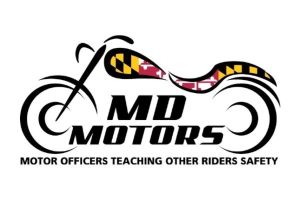
GLEN BURNIE, MD (May 9, 2022) – Sometimes you see them, many times you don’t. To raise awareness and encourage all travelers to share the road with motorcycle riders, Governor Larry Hogan has proclaimed the month of May as Motorcycle Safety Awareness Month in Maryland. In support of the proclamation and general motorcyclists’ safety, the Maryland Department of Transportation Motor Vehicle Administration’s (MDOT MVA) Highway Safety Office and Maryland State Police announce the launch of the new Maryland MOTORS (Motor Officers Teaching Other Riders Safety) motorcycle training program.
In 2021, there were 74 motorcycle-involved fatalities in Maryland, an increase from 2020 when 68 fatalities occurred in the state. More can be done to promote safety on Maryland roadways.
“Motorcyclists are among the most vulnerable roadway users, and it’s up to each and every Marylander to take a second look for motorcyclists while traveling,” said Chrissy Nizer, MDOT MVA Administrator and Governor Larry Hogan’s Highway Safety Representative. “Motorcycle Safety Awareness Month is an important time to remind drivers and motorcycle riders to look out for each other, avoid distractions and drive responsibly.”
According to the results of a recent Road Safety Behaviors and Attitudes study conducted on behalf of MDOT MVA’s Highway Safety Office, motorcyclists have high interest in additional or advanced training. Overall, 40% of motorcycle drivers surveyed said they have already participated in an advanced rider training course, while 22% have only taken a beginner course and 5% said they received no training whatsoever. Thirty percent of respondents reported they had been trained by another driver/operator.
More than 90% of motorcyclists surveyed “strongly” or “somewhat agree” with the premise that supplemental training in motorcycle operation/driving has benefits, and 80% would be interested in taking a free motorcycle training course taught by law enforcement agencies.
In partnership between the MDOT MVA’s Highway Safety Office and Maryland State Police, the new Maryland MOTORS class will launch June 1, 2022. It’s a motorcycle safety class for civilian riders taught by police officers. The free classes are open to all motorcyclists with a valid motorcycle license and insurance. The two-part training consists of a classroom portion and a road portion where the civilian riders are accompanied by the motorcycle officers on an actual ride. During and after the ride, officers communicate with the civilian riders about ways to stay safe, along with evaluations of riding techniques intended to increase the safety of the civilians.
Maryland MOTORS classes are open for registration on a first-come, first-served basis. Civilians interested in taking a class can sign up here. An additional list of training centers where riders can ensure they have the skills and mental strategies for responsible motorcycle operation can be found on ZeroDeathsMD.gov/Road-Safety/Motorcycle-Safety.
“Maryland is working hard to create and maintain a transportation network that’s safe and accessible for all users – and that includes motorcyclists,” said MDOT Secretary James F. Ports Jr. “Looking out for one another on our roadways means practicing safe driving behaviors and always being aware of our surroundings and the fellow travelers who are sharing the road.”
As part of Motorcycle Safety Month, MDOT MVA is encouraging drivers and riders to share the road and help protect one another by using the following tips:
For Drivers:
- Share the road with motorcyclists. Motorcyclists can use the full travel lane, so give them space and don’t cut them off.
- Look twice for motorcycles. When there is a crash involving a car and a motorcycle, the car driver is at fault more than half of the time. Signal your intentions and always check two or more times before making left turns, merging, changing lanes or pulling into traffic.
- Remember that motorcyclists are smaller than cars. Drivers tend to look for other cars and trucks, not for motorcyclists. And, because a rider and their motorcycle are smaller than a car, they are often difficult to see.
- Minimize and check your blind spots. Motorcycles are easily hidden by a driver’s blind spot. Check your mirrors regularly when driving and adjust them to show more of the road and less of your vehicle.
For Motorcycle Riders:
- Be courteous, non-aggressive and respectful of other road users when riding.
- Make yourself visible at all times. Choose riding gear that increases your visibility in traffic, in addition to providing protection in the event of a crash. Use bright colors and retro-reflective strips or decals, especially at night.
- Ride so you are seen. There is no one “safest” place to ride in terms of visibility. Use lane positioning to be seen by drivers. Ride with your headlight on and consider using a modulating headlight.
- Give yourself space and time to react. Allow space for braking or for avoiding a crash.
- Signal your intentions. Signal before changing lanes. Avoid weaving between lanes. Flash your brake light when you are slowing down and before stopping. Make your lane changes gradually.
- Learn early, learn often. Motorcycle safety training courses have much to offer new, experienced and returning riders. Keep your skills sharp by regularly participating in motorcycle skills training courses.
Motorcycle crashes are preventable. The MDOT MVA Highway Safety Office’s Be the Driver safety awareness campaign reminds both drivers and riders to drive sober, put the phone down, slow down and buckle up when in a vehicle. The message to “Be the LOOK TWICE Driver” will be shared throughout May, depicting how a driver can easily see a motorcyclists one second, and how quick that motorcycle can disappear in a blind spot. Public service advertisements will run on Facebook, WBAL Radio, 98 Rock and select billboards across the state.
Learn more about MDOT MVA’s Highway Safety Office’s commitment to zero deaths on Maryland roadways at ZeroDeathsMD.gov and on Facebook, Twitter and Instagram at zerodeathsmd.gov.
###